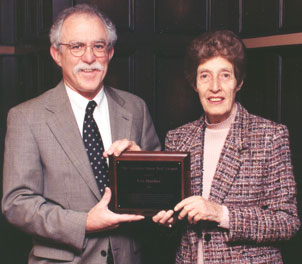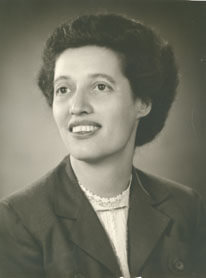Professor Eva Mueller, 1920-2006

Eva Mueller receiving the Carolyn Shaw Bell Award on Jan. 6, 2001
Professor Eva Mueller died on November 19, 2006 at the age of 86.
Dr. Mueller, a U-M Professor Emerita of Economics and Research Scientist at PSC at the time of her death, had a long and fruitful career at Michigan. But she faced many challenges on her path to success.
Fifty-five years ago, when Mueller received a PhD in economics from Harvard University, she asked the chairman of the department for help finding a job. “He said he couldn’t help me, since economics wasn’t a woman’s field,” she recalled. Undeterred, Mueller found a research job at the Institute for Social Research (ISR), where she helped to pioneer the use of surveys to analyze consumer behavior. After six years, she received a tenure-track appointment as an assistant professor in the Department of Economics and in 1964 was named a full professor.
“The struggle isn’t over yet,” she said, accepting the Carolyn Shaw Bell Award Jan. 6, 2001 from the American Economic Association’s Committee on the Status of Women in the Economics Profession.
Mueller was nominated for the award, given annually to an individual who has furthered the status of women in economics, by several former students, along with David Lam, professor of economics and director of ISR’s Population Studies Center, and Sherrie Kossoudji, associate professor of social work and adjunct associate professor of economics.
“Eva was really unusual as a woman breaking into the male-dominated field of economics,” noted Lam. “She was a real role model for many of us,” said Kossoudji. “She was also consistent in her support for young female students. And she made us tough. ‘You must do better,’ she told us. ‘You must work harder.’ That was always her approach.”
Born February 26, 1920, Mueller said she was influenced by the Great Depression in making her career choice. “It impressed me that what the world needed was to rescue its economies,” she said. Also, her mother, who had a PhD in chemistry, emphasized education for her children. “She had her mind set that all her children must get PhDs.”
 During WWII, she said, when the Harvard Economics Department “was more or less closed down… because all of the faculty was in Washington working on the war effort,” she took a job at the Federal Reserve Bank in New York.
During WWII, she said, when the Harvard Economics Department “was more or less closed down… because all of the faculty was in Washington working on the war effort,” she took a job at the Federal Reserve Bank in New York.
After the war, Mueller studied under Alvin Hansen, “at the time the number one Keynesian in the U.S.” Upon completing her PhD, she needed a job.
“I wrote some letters to people whose stuff I had read and thought they would be interesting to work for. One was George Katona. He happened to know George Garvey, for whom I had worked at the Federal Reserve, so he wrote to him and asked if I would be a plausible candidate. That’s how I came to Michigan to the Institute for Social Research.
I wanted to go to the economics department, but they would not accept me. Then I was sort of on the waiting list. John Lansing and, I think, even Jim Morgan, were on the waiting list ahead of me. They eventually got to me.”
In 1951 Mueller joined the staff of the Survey Research Center; in 1957 she joined the Department of Economics, where she became a full professor in 1964. Six years later, she became a research scientist at the Population Studies Center. Mueller had been a Professor Emerita since 1988.
During her long and active career at Michigan, Eva Mueller made important contributions in several areas of economic research. For the first two decades, her research emphasized analysis of consumer behavior in the U.S. She later moved on to work related to economic development and economic demography. Her published papers cover a wide range of topics and countries, including the impact of unemployment on consumer confidence in the U.S., the economics of fertility decline in Taiwan, and the time allocation of women and children in Botswana.
In addition to her contributions as a researcher, she played an important role in building the economic demography training program run jointly by the Population Studies Center and the Department of Economics. She served as an advisor to many PhD students in economic demography who have gone on to positions in universities, government, and international agencies.
The Eva Mueller New Directions in Demography and Economics Fund has been established to support research and training in demography and economics, especially projects focusing on low income countries and projects dealing with the socioeconomic position of women and investments in children’s health and human capital.
